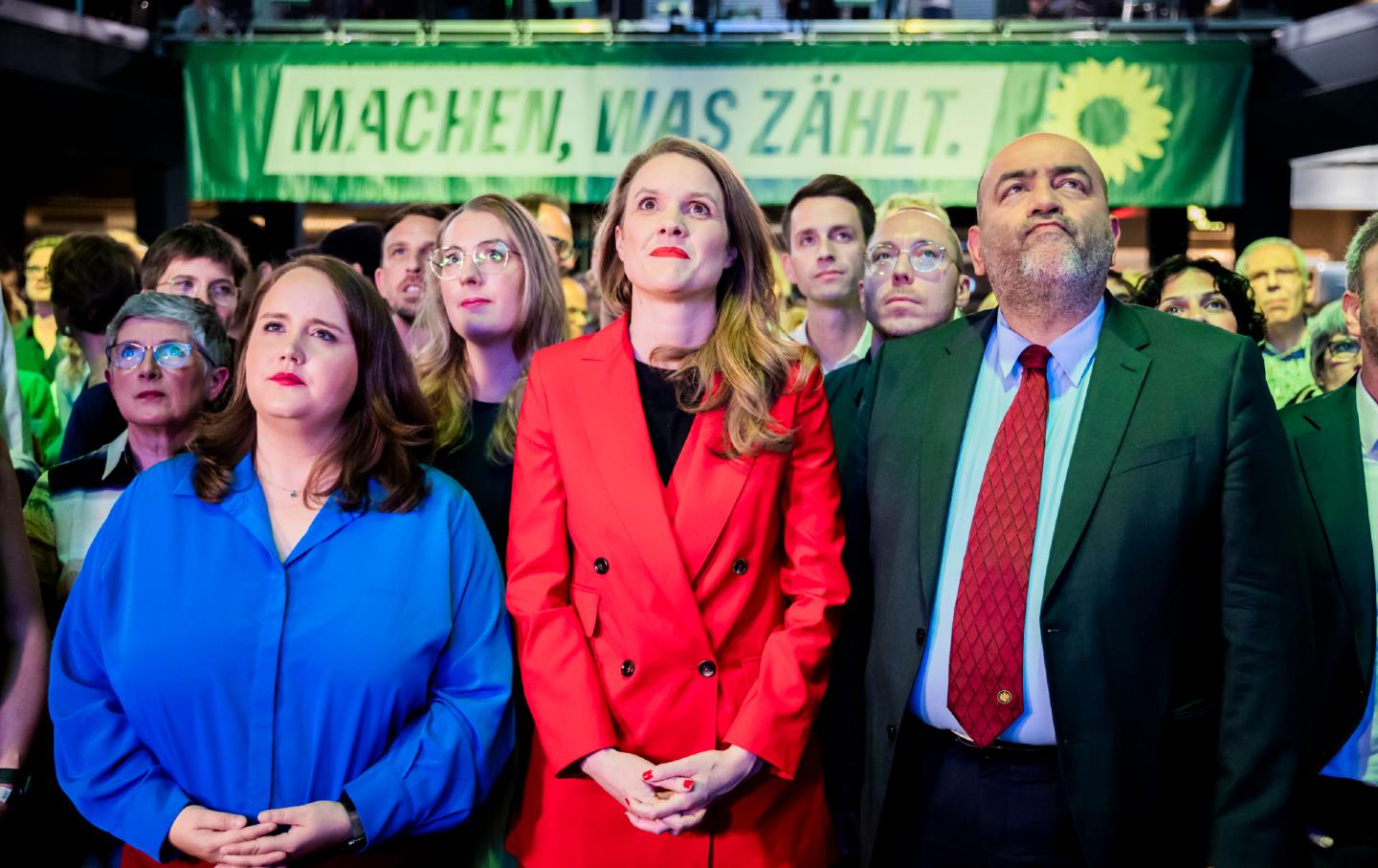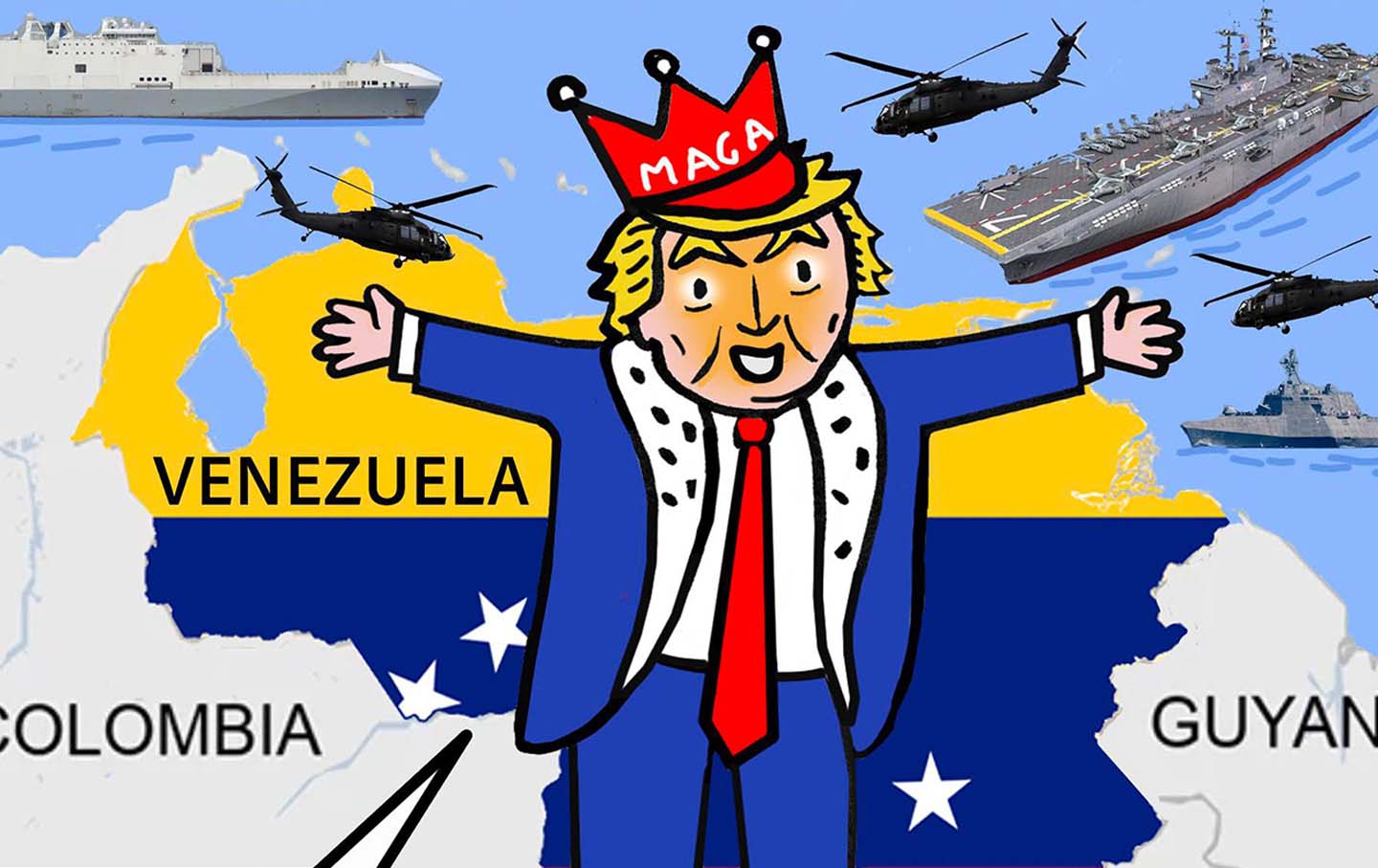How the Greens Became the Driving Force of German Militarism
The Greens, founded as a pacifist party, are now enthusiastic cheerleaders for rearmament.

From left to right, Ricarda Lang, a federal chairperson of Bündnis 90/Die Grünen; Terry Reintke, the Greens’ lead candidate for the 2024 European elections; and Omid Nouripour, a federal chairperson of Bündnis 90/Die Grünen react to the first projections at the Greens’ election party in the Columbiahalle in Berlin.
(Christoph Soeder / picture alliance via Getty Images)

Stability used to be one of Germany’s greatest virtues. Not anymore. A political crisis has triggered an early federal election on February 23. And Europe’s largest economy has been in recession for two years. German industry has been hit by soaring energy costs following EU sanctions against Russia. Major business groups such as Volkswagen are planning to cut tens of thousands of jobs; business bankruptcies are at their highest level since the 2008 financial crisis, and deindustrialization looms. Last November, the ruling coalition between the Social Democratic Party (SPD), the Greens (Die Grünen), and the liberal Free Democratic Party (FDP) fell apart over 2025 budget disputes.
Paying for arms deliveries to Ukraine has been a key factor. The huge cost of Germany’s own rearmament was already weighing on government finances. Since 2022, when Chancellor Olaf Scholz pledged a special fund of €100 billion ($104 billion) over five years to strengthen the armed forces, the Greens, SPD, and Christian Democratic Union (CDU) have talked of up to another €300 billion, separate from the regular budget allocation for defense (Der Spiegel, February 16, 2024). The fact that NATO countries already have 10 times Russia’s military budget doesn’t enter into the debate.
All parties except the left-wing Die Linke and Sahra Wagenknecht Alliance agree that rearmament on an unprecedented scale is needed, but they differ on how to pay for it. The CDU, the far-right Alternative for Germany (AfD), and FDP propose drastic social spending cuts, while the SPD and Greens favor increased borrowing—though they have not ruled out a pro-austerity alliance with the CDU, whose leader, Friedrich Merz, says Germany should “dare to be more capitalist.” Political scientist Christoph Butterwegge fears there will be a “frontal assault on the welfare state” after the election.
Germany’s new militarism, unthinkable just a few years ago, has coincided with a radical change in its political culture. On SPD election posters, Defense Minister Boris Pistorius (SPD), who has called for an army “fit for war by 2029,” poses in combat gear, weapon in hand—a spectacular U-turn for the party whose policy of détente and rapprochement with the Soviet Union once earned Chancellor Willy Brandt the Nobel Peace Prize.
Arms, arms, and more arms
But no party has changed more than the Greens. Founded in 1980 as an anti-war party, they have in recent years become fervent and bellicose advocates of rearmament. Anton Hofreiter, who for many years cochaired the party’s parliamentary group in the Bundestag, is continually demanding “arms, arms, and more arms,” and criticizes the SPD’s refusal to send Ukraine Taurus long-range cruise missiles.
During the 2021 federal election campaign, the Greens insisted that arms should not be supplied to belligerents in a conflict; barely a year later, Foreign Minister Annalena Baerbock (Greens) outlined the new doublespeak of Green policies: “Arms shipments help save lives,” she said in the Süddeutsche Zeitung in September 2022. Her predecessor Joschka Fischer has since called for the EU to develop its own nuclear arsenal, an idea supported by supposedly progressive journalists such as Ulrike Herrmann of taz.
The Greens, with their coalition partners and the two main opposition parties—the CDU and AfD—also support Israel’s wars in the Middle East. As the largest supplier of arms to Tel Aviv after the United States, Germany protects Israel financially and diplomatically. While the federal government casts itself as a resolute defender of international law in Ukraine, it makes a mockery of it when it comes to Israel, helping it commit war crimes that Amnesty International and Human Rights Watch class as genocide. Neither Baerbock nor economy minister and deputy chancellor Robert Habeck (also the Greens’ candidate for chancellor) has questioned the arms shipments or suggested they should be conditional on Israel ending its assault on Gaza.
A military shade of green
The shift to a distinctly military shade of green shocks the few party activists who recall the 1980 founding manifesto: “Ecological foreign policy is a policy of nonviolence.… Nonviolence does not mean surrender, but guaranteeing peace and life by political rather than military means.… The development of civilian rule founded on the guiding value of peace must go hand in hand with the immediate commencement of the dissolution of military blocs, especially NATO and the Warsaw Pact.” In the middle of the Cold War, it called for “the dismantling of the German arms industry and its conversion to peaceful production.”
Popular
“swipe left below to view more authors”Swipe →A major turning point in the Greens’ transformation into the party of war was the Kosovo conflict. In spring 1999, the SPD-Greens coalition, headed by Gerhard Schröder (SPD) with foreign minister Joschka Fischer (Greens), decided that Germany would take part in NATO’s bombing of Serbia without UN Security Council backing. This violated the UN charter, the Two Plus Four agreement, and the German Constitution, which bans wars of aggression.
At the 1999 party conference, Fischer justified this decision with the words, “Never again Auschwitz, never again genocide.” His comparison of the civil war in Kosovo to Auschwitz drew protests from Holocaust survivors, who called it “shameful,” but it helped secure the party’s approval of Germany’s involvement in the NATO campaign. Comparing the West’s adversaries to Hitler and his extermination of Jews in order to legitimize military interventions has been part of the Greens’ repertoire ever since. In April 2022, former environment minister Jürgen Trittin drew a parallel between the Russian troops’ massacre of Ukrainian civilians in Bucha (around 200 according to the UN) and the atrocities committed by the SS mobile death squads who executed hundreds of thousands of Jews in Eastern Europe.
Over the years, the Greens’ foreign policy has gradually aligned with that of the US neocons. The promotion of “Western values,” if necessary by means of military intervention, has been supported by Atlanticist think tanks whose members include prominent Greens. Baerbock, who says she is inspired by former US secretary of state Madeleine Albright, was a fellow of the German Marshall Fund of the United States, while most senior party figures in the last 20 years, including Claudia Roth, Katrin Göring-Eckardt, Cem Özdemir, Reinhard Bütikofer, and Omid Nouripour, have been members of Atlantic Bridge, a network of bankers, military strategists, journalists, and politicians that aims to strengthen German-US relations.
From the US standpoint, co-opting Greens leaders has been a major success: The party that once favored NATO dissolution now campaigns for its enlargement and the militarization of German foreign policy. In the standoff with China, the Greens have aligned with the US hawks as well. The shift has driven a large wedge between the circle of environmental activists, still close to the Greens, and the peace movement; their close relations were once the source of the movement’s strength.
A key figure in this shift is Ralf Fücks, a former Maoist, later codirector for two decades of the Heinrich Böll Foundation (affiliated with the Greens). He is now director of the Center for Liberal Modernity, a Berlin think tank that aims to defend “liberal democracies” against “authoritarian regimes” through rearmament and Atlanticism. This supposedly nongovernmental organization is financed largely by the German state.
Forget pacifism and anticapitalism
In the late 1980s, Fücks and political activist Daniel Cohn-Bendit were both members of a faction that sought to turn the Greens from anticapitalism and pacifism. In 1998, however, the Greens’ federal election manifesto still called for “a pan-European order of peace and security” that could “replace NATO and provide the conditions required for complete disarmament.” These election promises disappeared for good after the Greens joined the federal government and voted for the Kosovo war.
The other major factor behind the shift is demographic change among the party’s voters. The dissenters of the 1970s became the well-to-do, urban, and educated classes of the 1990s, which is where the party now finds its supporters. Some 78 percent of the Greens’ electorate say they are in favor of continuing arms deliveries to Ukraine, more than in any other party, but only 9 percent would be prepared to take up arms themselves to defend their country. Fighting Russia to the last Ukrainian is their answer to the project of military commitment in the name of “Western values.”
Since February 2022, the Greens’ foreign policy positions have been among Germany’s most hawkish. Immediately after the invasion of Ukraine, Baerbock, like many Western politicians, said steps should be taken to “ruin Russia.” On April 6, 2022, Jürgen Trittin said in the Bundestag, “We’re sending Vladimir the Terrible’s Russia back to the 1960s,” and suggested that sanctions should continue even after the war ended. Accordingly, the Greens opposed all efforts to find a diplomatic solution, even after the US and Ukrainian chiefs of staff admitted they were facing a military impasse. However, the strategy of weakening Moscow and permanently detaching the EU from Russia comes at a price for Germany: the threat of industrial decline. Any tariffs imposed by the Trump administration are bound to exacerbate the situation, as is Germany’s growing decoupling from China. Berlin finds itself increasingly isolated between the major blocs.
Though party membership doubled between 2017 and 2024, the Greens’ share of the vote in the June 2024 European Parliament election wass virtually halved to 11.6 percent, compared with 20.5 percent in 2019. Their losses were largest among young voters. And in September, the party suffered a further rebuff in parliamentary elections in the former East German Länder of Thuringia, Brandenburg, and Saxony, where it lost all its seats in the state governments. In Thuringia and Brandenburg, the Greens’ share of the vote did not even reach the 5 percent threshold for reentering the parliaments. The party’s national leaders, Omid Nouripour and Ricarda Lang, announced that they would step down at the November party conference. The leaders and the entire executive committee of its youth organization also resigned, and even quit the party because it was taking a direction incompatible with their ideals. Yet the national leadership shows no sign of changing course. Robert Habeck has called for Germany to spend 3.5 percent of its GDP on defense, devoting a significant chunk of the federal budget to the most environmentally damaging sector of the economy. The idea of positioning Germany and the EU as a force for peace between the rival blocs in the new geopolitical reality is not even mentioned.








